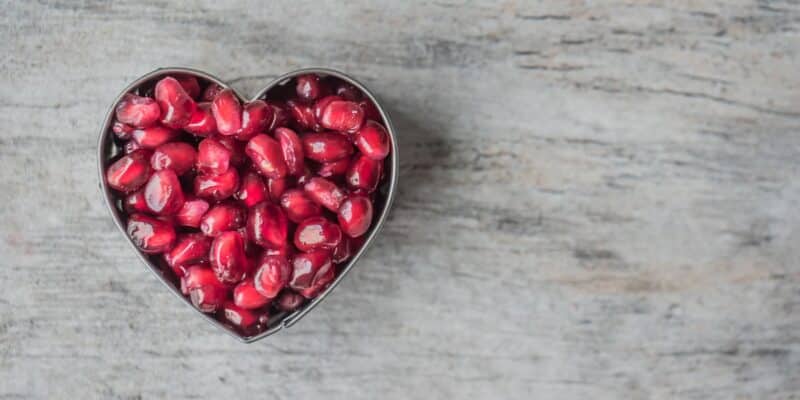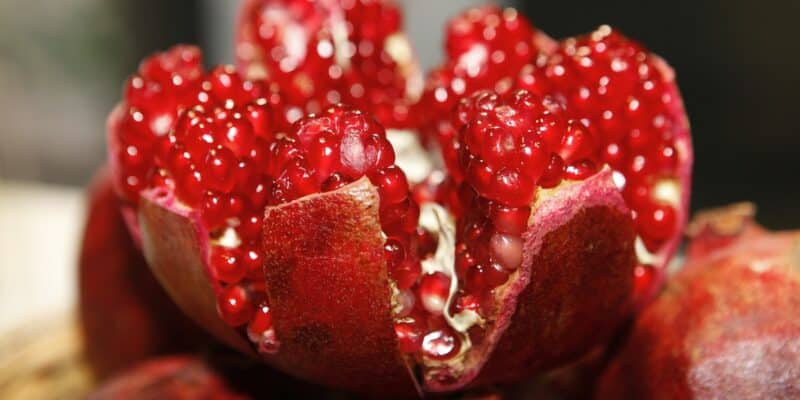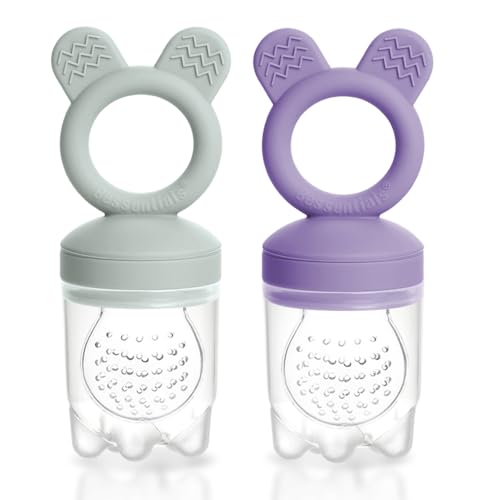Pomegranate is a popular semi- tropical fruit that contains loads of edible seeds. The fruit is famous for its high nutritional and antioxidant properties that support your baby’s growth and development.
Pomegranate is also often used as a natural remedy to support babies’ gut health, due to the high value of fiber, potassium, iron and folic acid found in the fruit. The high nutritional value of pomegranate makes it a great healthy and filling fruit to add to your baby’s diet.
However, due to the high amount of seeds found in this fruit, many parents wonder when it is okay to start introducing it into their baby’s diet and how they should be doing it, all of which is going to be explored in this article.
As an Amazon Associate, I earn from qualifying purchases. The links below may be affiliate links. Please read my disclosure policy for more information.
Pomegranate, Is It Safe?

Pomegranate is a great fruit for babies to eat. They are nutrient- dense, rich in various vitamins and antioxidants and are generally a great addition to a baby’s diet.
Pomegranate contains vitamin C, vitamin K, potassium, fiber and folate, all of which are important for supporting your baby’s growth and development in a healthy way. Pomegranate is also low in fat and calories, which makes it a perfect healthy food choice for a healthy diet.
However, it is important that you are cautious and careful when introducing this fruit to babies, especially if you have not introduced your baby to solid foods (or other fruits) yet.
Health Benefits Of Pomegranate For Babies
Pomegranate is a rich source of vitamins and minerals that are essential for your baby’s growth and development. Here is a breakdown of the health benefits of pomegranate for your baby:
Nutrition
Pomegranate has a high amount of vitamins and minerals (such as: folate, fiber and potassium), all of which are great nutrients for supporting your baby’s nutrition and protecting your baby from diseases (by improving the immune system).
Inflammation
Extracts from the pomegranate can reduce inflammation caused by various types of bacterial infections, due to an antioxidant found in the fruit. This makes it a great natural remedy.
Digestive Problems
Pomegranate has been used as a common fruit in traditional medicine practices. Specifically for the treatment of digestive problems like constipation, diarrhea and vomiting.
Pomegranate is also considered to be a natural constipation reliever, due to its high fiber content.

Intestinal Worms
Some babies may get parasites that live in either the small or the large intestine, which multiply by feeding on nutrients. Pomegranate fruit has anthelmintic properties, which are able to help kill intestinal worms.
Please note that pomegranate is not an alternative for medical treatment, and you should always consult your pediatrician with any questions regarding your baby’s health.
As mentioned before, pomegranate comes with lots of vitamins and minerals. Here is a breakdown of some of them:
Vitamin C
Pomegranates are a great source of vitamin C, which is an essential vitamin for supporting your baby’s immune system. It also helps with the absorption of iron, which is especially important for when your baby is in their most active growth stage.
Fiber
Pomegranates are also high in fiber, which help your baby with digestion and prevention of constipation. Fiber also helps your baby feel full and satisfied after eating, preventing overeating and promoting a healthy weight gain.
This can also set your baby up for a lifetime of healthy eating.
Antioxidants
Pomegranates are rich in antioxidants. They help protect your baby’s cells from damage and also, along with vitamin C, boost your baby’s immune system.
This is particularly helpful during flu season, as babies are more prone to getting sick.
When Can Babies Start Eating Pomegranate?

Generally speaking, when babies are around six months of age, you can start introducing them to solid foods. When thinking about what food is safe and what food is not safe, you can add pomegranate to your list of safe foods.
Due to pomegranates’ high antioxidant properties it is a wonderful fruit for babies, with lots of health benefits.
If your baby starts eating solid foods, you can start serving pomegranate juice after six months of age. Once the baby is a little older (around 12 months) you can introduce your baby to the fruit itself, however without seeds.
Pomegranate is an ideal food for babies, due to its richness in nutrients and medical properties. For example, it is rich in vitamin A, vitamin E, potassium, iron, folic acid, fiber and different minerals.
You can even include pomegranate in your baby’s regular diet, to ensure that they get the right balance of nutrition, without being too scared about your baby getting an allergic reaction.
How To Prepare Pomegranate For Babies
Before preparing the fruit, it is important that you eliminate any risks of your baby choking on any liquid, puree or food. It is highly advised that you create a safe eating environment for your baby.
It is also important to note that every baby develops at their own speed, therefore this is just a generalization of when pomegranate is okay to be served. With that being said, here is a breakdown of how it is suggested to serve pomegranate to babies of different ages.
6 to 12 months
Crush or flatter the pomegranate seeds with a knife or the back of a spoon. This is because whole pomegranate seeds can be a choking hazard for babies up to the age of 12 months.
It is also recommended that you start by serving pomegranate juice first instead of actual pomegranate pieces to your baby, as at this age pomegranate juice presents a smaller choking hazard to your baby.
12 to 18 months
At this age, you can serve the whole pomegranate seeds to your baby. If you want to add whole seeds to foods like yogurt, your baby may not understand the need to chew pomegranate seeds and accidentally swallow the seed as a whole.
Therefore, it is generally safer to serve the whole seeds on their own, until your baby is comfortable with chewing and processing different foods.
18 to 24 months
At this time, you can serve pomegranate however you want, by adding them into savory dishes, or serving them on their own. Around this age, pomegranate does not present a large choking hazard.
However, make sure to supervise your baby at all times during meals as the risks of choking are low, but not zero.
Risks Of Pomegranate For Babies
Pomegranate seeds are generally a choking hazard for babies under the age of 12 months. The seeds may be small, however they still present a risk of your baby swallowing the seed as a whole by accident.
To reduce the risk of choking, flatten each seed with a fork, spoon or knife before serving. Or you can also wait until your baby is able to pick up small pieces of food and chew/ swallow food with ease.
When it comes to allergies, pomegranate allergy is rare, however there were some reported cases. Acidic fruits can also cause a rash when skin comes into contact with it (in babies, it is generally around the mouth, cheeks and under the chin).
If you notice this happening to your baby, pat the affected area with a cool washcloth (do not rub), and the rash should shart going away after a few minutes. However, make sure to call your pediatrician if you see any signs of an allergic reaction.
It is also important to remember that whenever you are introducing new foods to your baby, you should start by offering a small quantity and generally increase the portion size, so that you are able to monitor your baby for any signs of an allergic reaction.
You should also be introducing one new food at a time to your baby, in order to be able to monitor allergy symptoms more accurately.

Pomegranates are a popular food amongst parents, which can be a safe and healthy choice of fruit for babies.
Since pomegranates are packed with essential nutrients like vitamins, minerals and antioxidants, the fruit is able to aid your baby in healthy growth and development while at the same time teaching your baby to eat healthy.
However, it is important that pomegranates are served and introduced properly to babies, especially if your baby is under twelve months old. The biggest concern that pomegranate presents to a baby is a choking hazard (from the seeds).
Therefore, it is important that all seeds are removed from the fruit before serving. Pomegranates are generally not a common allergen, however it is possible to be allergic to the fruit, so you need to be cautious when introducing it to your baby.
Generally speaking, pomegranates are a great healthy food for your baby, however you should always contact your pediatrician with any questions or concerns regarding your baby’s health. By being mindful of the risks and preventing them, parents can safely introduce pomegranate into their baby’s diet.

